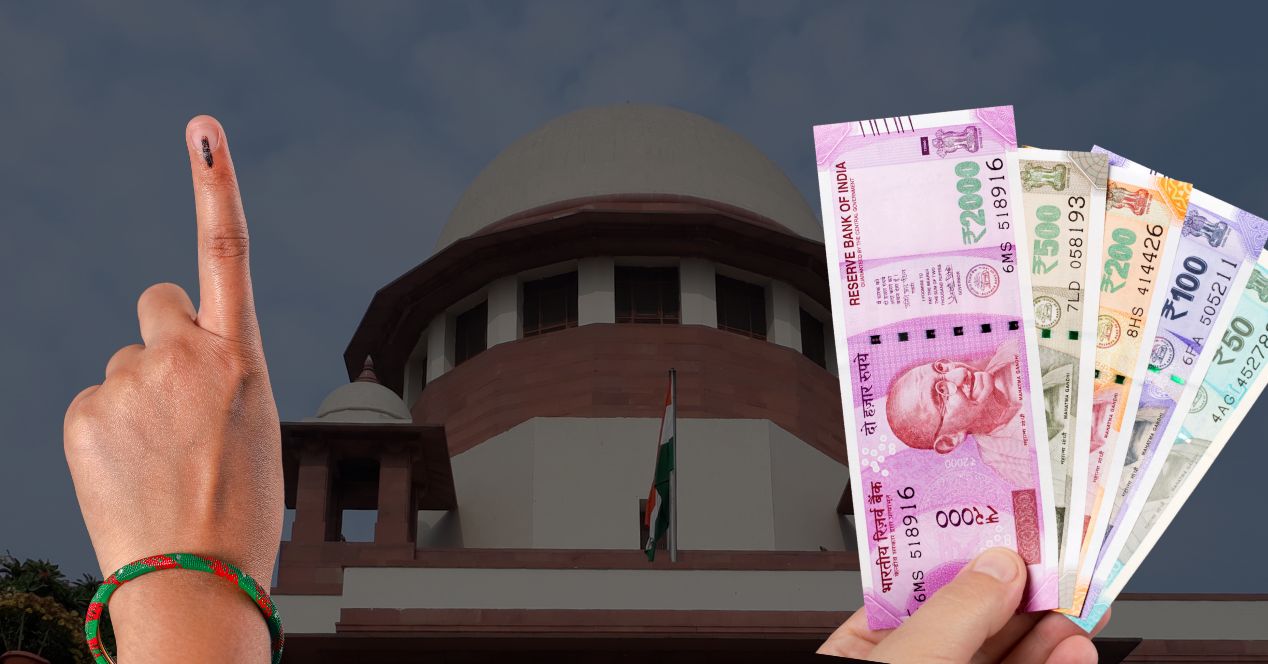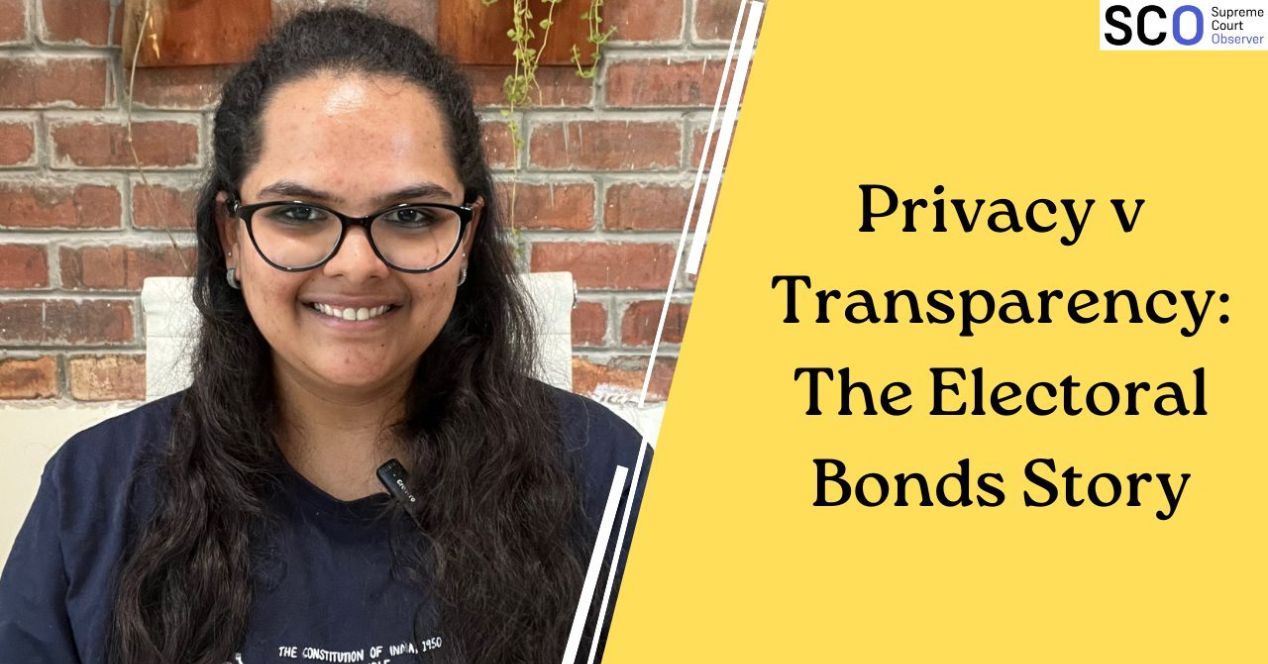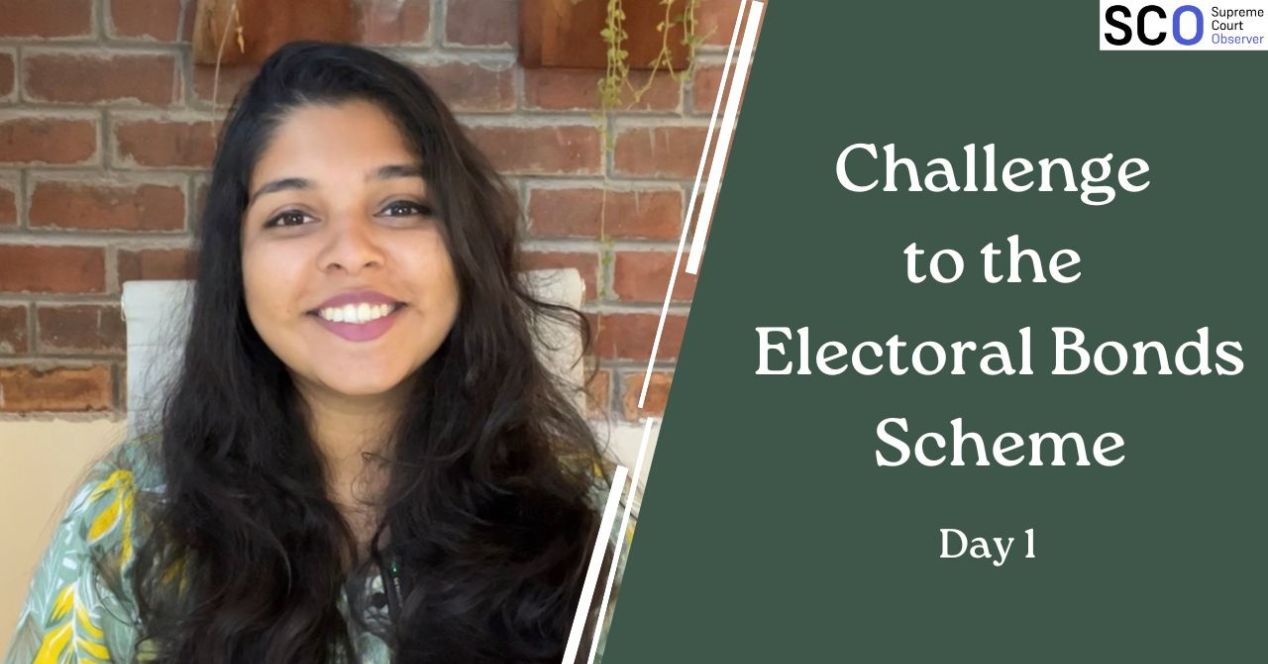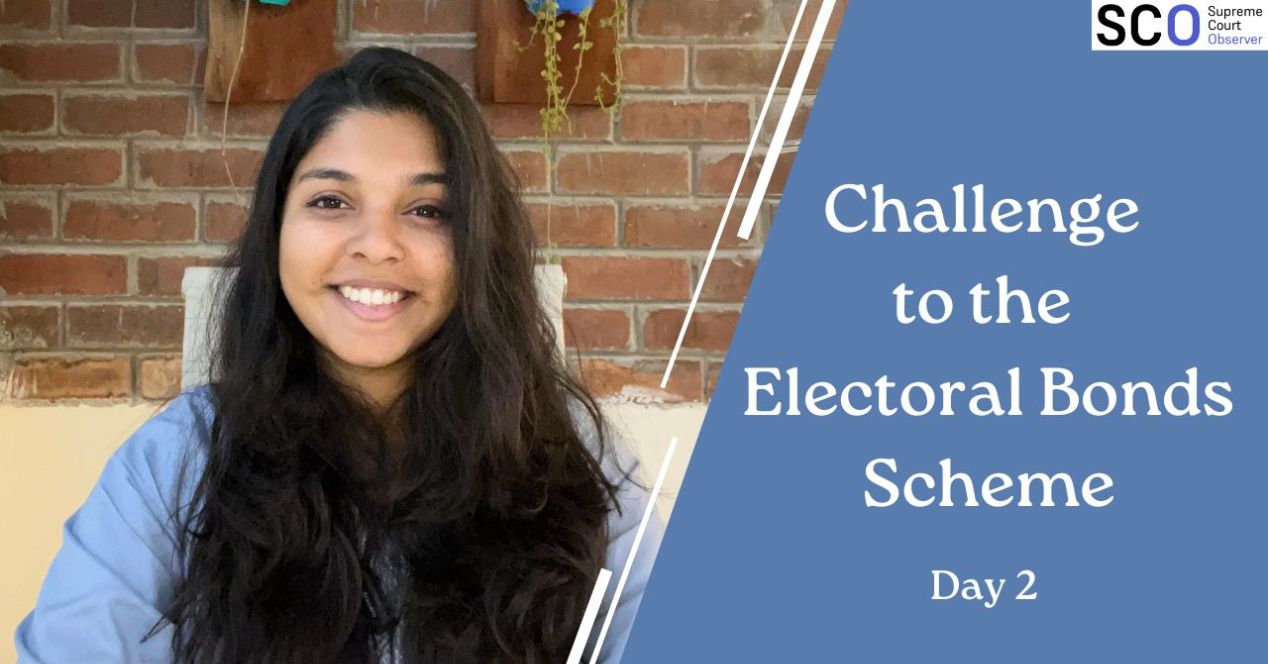Channel
“An unequal playing field will not disappear once we have transparency”: Dr. Udit Bhatia on the Electoral Bonds Scheme
Bhatia argues that the democratic dividends of transparency are going to be lost if parties continue having disproportionate campaign power
Transcript:
Hello, everyone. Welcome to the Supreme Court Observer. I’m Gauri Kashyap, and today I’m in conversation with Dr. Udit Bhatia, who is a political theorist whose research focuses on normative democratic theory, constitutionalism and political epistemology.
Today, we’re talking about election funding and the challenges of private, opaque funding of political parties and election campaigns. Before we get into the debate, let’s set the context for our viewers. Why are we talking about political funding and democracy in the same breath? What is the context of this conversation?
The context, of course, is the electoral bond law. In 2017, there’s this new law which allows companies to donate anonymously to political parties, which leads us to the debate about the relationship between corporate funding, campaign finance, and democracy. I believe it’s a debate that should have actually started much before, because we imagine a lot of our problems with political funding and democracy started after 2017, whereas even pre-17’, we were living in a system of political campaign finance funding that’s democratically troubling.
And it’s democratically troubling because there are two issues. Firstly, it allows wealthy private interests to have a disproportionate say, over the democratic process. And secondly, because it allows parties to have extreme levels of inequality in how much money they can hold. And these issues don’t often get disaggregated. These are distinct issues, and both of them need tackling. The issue of disproportionate private influence on elections and the issue of unequal funding that parties hold, both of which are detrimental for democracy. This is a debate we should have been having more seriously before 2017. But I’m very glad we’re having it now.
And the 2018 Electoral Bonds Scheme accelerates that. And now we’re at a stage where the hearings on the challenges to the electoral bond scheme have been completed, and we’re awaiting judgement. So maybe our conversation now can then go into some of the arguments that have been made and address the merits in the case.
The union government’s argument so far has come from this premise that companies have a right to donate to political parties. That is, they have a say in what parties they support and what kind of economy they want. What are your views on this? The idea that a company has a right to donate?
I guess there are two different questions here. Firstly, does a company have a right to donate? And secondly, does a company have the right to donate for the sake of its economic interests? I’ll pick up the second question first.
Even if companies have a right to donate to political parties, I’m arguing in a paper I’m working on, that it cannot be for the sake of economic interests. We want economic competition between parties. But healthy competition doesn’t extend to competition about changing the rules of competition.
Just like we want India and South Africa to compete on the cricket field, we don’t want them to compete about how to change the rules of cricket at the ICC to benefit their players.
So economic competition is about competing within the economic framework, not about competing to change the rules of the economic framework.
So even if parties have a right to donate to political parties, it cannot be a right grounded in the pursuit of their economic interest. It could be for reasons of supporting a particular ideology, believing a particular party is good for the common good. But it’s not a right we can ground in their pursuit of economic interest. We don’t want companies competing in that way.
Do parties have a right to donate to political parties, regardless of whether it’s for economic interest or not? I don’t think that’s the right question. The right question, I suppose, would be to ask, would it be good for democracy if companies donated to party’s campaigns?
And I have an argument for why it may be good that corporations can donate to parties, but we need to make sure that they’re regulated in very stringent ways. Workers have to authorise those donations.
So the question we should start with is, ‘is it good that parties get donations from companies? And if so, how do we structure those donations such that they serve democratic principles?
You touched upon this briefly, when you said, if a company has an ideological belief, and in pursuit of that, they can make donations. But let me push a little bit on that, which is, what are those metrics that we are okay with when companies involve themselves in the electoral process?
Good point. So I suppose the idea here is that we need to design governance decisions about how companies donate to parties as if they were not pursuing their economic interests. So we don’t go about monitoring whether or not that donation is made for economic interests or not.
The structure of decision-making of how a company donates to a party has to be designed as if it were not for economic interests. And once we do that, we give workers a right. Because if there is any argument for workers not having a say in corporate decision-making, it is the argument that managers or shareholders have expertise, technical skill and experience to enhance the economic interests of the firm.
I don’t agree with that argument. I think workers are equally good, perhaps, at pursuing the economic interests of the company. But even if we grant the argument that managers need to have decision-making power and workers should be excluded when the economic interests of the company are at stake. Once we recognise that donations can’t be about the economic interests of the company, this argument from managerial prerogative just disappears. There’s no reason to withhold this power of allocating funding from workers.
You bring up the culmination of your thesis, which is that workers should have the say in who their company donates to. We’ll sort of slowly build to that.
Before we get into that, we’ve talked about— you said for the democracy itself, for the economy itself, it may be a good idea for companies to donate and to have that financial say in where elections go. But there has to be some regulation, right?
So in the past they’ve done it in terms of, from the company law point of view, and they’ve said, this is a certain percentage of your net profit in the last three years that you can—I think, 7.3% of your net profit you can donate. They’ve done it from the point of view of process, what is the acceptable channel? And that’s where we’ve arrived at electoral bonds. Where does that point of regulation begin?
Yeah, I suppose I don’t have a fixed view on regulation. I’m more concerned with who gets to decide within the company on which particular party gets the money. I think there’s a separate conversation to be had about the extent to which parties should receive funds. Should there be a cap on a political party’s expenses? Should there be a cap on companies’ ability to donate to parties? I think that’s a separate conversation. And we definitely need regulation on all of those fronts.
But even if there’s this, I wouldn’t call it myth, but there’s this fetishization of cap on party expenses, or cap on percentage of profits that companies can donate. As if once we have that, our democratic worries about corporate funding get resolved. And my point is that even if we have all those regulations in place, we still need to worry about who within the corporation donates the money. So I think these are very good debates happening around regulation of caps on parties and corporations.But they’re not enough in themselves.
Would you agree that the question of regulation then, comes from the answer to which is a more compelling question—are we more worried about who is giving the money or who is getting it, or how it’s being sent through?
Yeah, I guess there’s debate to be had on both fronts. For example, we might opt for a state-funded model of elections, right? And we say we are concerned about who’s getting money from these corporations. We think everyone should, every party should get money. We have a model of state funding that gives money to all political parties. And we might need to come up with a system of how we distribute that state funding. And I think that’s a very important debate to have.
There have been people who have argued for state funding of elections. So I think that’s one important strand of the debate. But I suppose my intervention in this debate is to say if we don’t have state funding collections, if we aren’t able to get where we want with the question of who gets the money, at that point we can at least start thinking about who gives the money. And rather than seeing the corporation as giving money, and therefore, inevitably, managers and shareholders, we can start thinking of who within the corporation is the one who gives this money.
So I am very happy with state funding of elections. I think there are some problems associated with it. But those dealing with those questions will get us into the question of who gets money. But I think we can also pull strings on the others— pull kind of theoretical innovations on the other side of who gives the money. I think we can have those debates side by side.
One of the biggest arguments that were made was that there are different kinds of inequalities that the electoral bonds system created. One is an inequality in information and the other— and we’ll get to that in a little bit. But the other question was an uneven playing field for the political parties involved.
Now, the Union’s response to that was, this has nothing to do with electoral bonds, that there was always an uneven playing field. People always favour one party over another, and whoever they favour, get the funding and that party wins. Do you think there’s merit—Or rather, where do you think the merit lies?
I think to some merit to that. It’s true that even without the electoral bond, a campaign finance system that creates an uneven playing field is a problem.
Does that mean we say, well, in that case, why worry so much about the electoral bonds? No, on the contrary, I think it means we should worry drastically that even before the electoral bond system, we’ve been living with a campaign finance system that permits an uneven playing field. So I think we can accept that argument and say, sure, it’s not just the electoral bond that’s contributed to it, it may have magnified it, of course, but it’s a problem that’s existed independently and we should have been worrying about it even pre 2017.
So the other part of that question of uneven playing field is the uneven distribution of information. There is a lot of focus given on transparency and an argument that’s been made by both sides saying that the electoral bonds are detrimental to transparency and that the electoral bonds were designed to ensure transparency.
But the next part of that argument that the Union makes is that transparency has to end because the privacy of the donor begins. That is, a lot of corporate entities were afraid of retribution from parties that they weren’t donating to, and that this was the primary concern. So when does privacy end and transparency begin, or the other way around?
I guess the first thing to note is that it is strange how privacy gets used in public law arguments. On the one hand, we are told the right to privacy in India is very different, but the moment it comes to corporate rights around private donations, suddenly there’s a very stringent right to privacy that trumps even an interest in transparency. And I think that we should be very sceptical of that.
That said, I have argued that transparency gets fetishised because we might again start to think, once we get transparency, we’ve got a reformed campaign finance regime in this country, and that’s not the case. Transparency is very important because it gives a chance for civil society actors, voters, political parties to point out corrupt arrangements or quid pro quo relationships or areas of policymaking which have been influenced by corporate donations to political parties. It gives them a chance.
But here’s the problem. As long as there is an unequal playing field, and the unequal playing field will not disappear once we have transparency, as long as there’s an unequal playing field, the party that gets all this money still has disproportionate capacity to engage in manipulation.
Even if the Congress party or the Aam Aadmi party or the BJP is able to show, look, this party has a corrupt relationship. The other party has disproportionate campaign funds to manipulate and deflect attention from the fact of this corrupt arrangement.
So inequality is in some sense a separate and much wider issue. And as long as there is this unequal playing field between parties, some of the democratic dividends that we get from transparency are going to be lost through parties just having disproportionate campaign power.
So would you go so far as to say you don’t advocate for complete transparency? Because I understand that’s not the argument you’re making. You’re rather saying that that may not be the most important thing, but in a setup like this, where it’s a democratic process, is transparency, or rather 100% transparency not something that we’re gunning for?
Like I said, is there a right to privacy with donations? No. If these donations have profound effect on policy making, on the interests that political parties are beholden to, then of course not.
We need to know where this money is coming from, who’s giving this money, and what parties are doing that might be in the interests of their donors. I think there should be every chance for voters, rival parties, civil society actors to find out about that.
So it’s hugely important. But my worry is just treating transparency as it sometimes appears in this debate, as an end in itself, rather than one limited component of a wider debate about campaign finance. Because as long as there’s an unequal playing field, like I said, the dividends we get from transparency will just be lost or will be marginal. So it’s hugely important. But when studied alongside further issues like how do we get a more level playing field between political parties?
Another argument that came up during the hearings was the idea of shareholder democracy. Some went as far as to say that it’s important that stakeholders have an understanding of who their company is donating to as a matter of right to conscience under Article 25. Do you see that right?
So that’s one part of the question. The second part is in service of your thesis, which is that you take that forward and say there’s shareholder democracy, but there’s also worker democracy, and that workers unions should have a say on who their companies donate to. Could you comment on that?
Yeah, so I think, again, saying shareholders should have the right to see where their money is going is again tied to this idea that shareholders have an economic interest in the company. They need to know if the company is donating it in the right way in the pursuit of their economic interests. And like I said, I don’t see corporate donations for parties as permissibly being for economic interests.
If there is to be— it’s a conditional argument— If there is to be a corporate donation to political parties, then it cannot be for the economic interests of that firm, or that company. And once we see party donations in this way, there’s no reason why shareholders should have a right to know what’s going on and workers shouldn’t, or shareholders should have a right to have a say on this decision and workers shouldn’t.
Could you comment on a few benefits of the right being vested on the workers?
Yes, of course. The first thing is that it expands the pool of people who get to decide. It’s not just wealthy shareholders, wealthy managers, CEOs, it’s a much wider pool of people who get to have a say on where this corporation gets to give its money.
Hopefully, as well, we’ll have to go into the empirics of this. But we could hypothesise that it will be a much more diverse pool of perspectives than simply shareholders and managers. So if we think of democracy as partly about the representation of diverse perspectives, more perspectives, a multitude rather than a narrow group of perspectives, then it’s better for workers to have that say than simply a narrow group of shareholders or an even narrower group of elite managers and CEOs. It’s about expanding the pool.
So if you were to work a better and an even better group to choose from, at least the worker group takes away from the economically elite group and of course, within it, as we’ve discussed in the session today, there may be different kinds of inequalities, social inequalities and various other kinds, but it does that one step better is the argument?
That’s right. It’s not a silver bullet, right? It’s not like expanding the pool of decision makers in this way will solve all problems that plague democracy and Indian democracy. But I guess we can at least make the limited argument that it is better for this wider group of workers to have a say on who gets the money than simply having unilateral decision making by a very narrow group. If nothing else, the system is better than the one we have.
So the judgement is expected sooner than later. What expectations do you have from it? What are you looking forward to or not?
Well, like I said, I’m not a constitutional law scholar, so I can’t comment on the legal fitness of the case that was made on either side. But I will return to what I said. I think even if the judgement goes in favour of more transparency, I hope what it does is spark off a political conversation in India about the model of campaign finance that ought to exist.
It’s a conversation that has needed to happen for a long time and it’s a political conversation that needs to happen, not simply a narrow legal one in court, because we need to think about more radical ways in which to overhaul the system of campaign finance that exists, how to reduce the influence of private interests, how to level the playing field between parties. And I don’t think this legal case has the answers to those problems. So my hope is that it’s a case that sparks off a wider conversation politically in years to come.
Well, with that, we wrap up the conversation. Thank you so much for speaking to us, Dr. Bhatia, and thank you for your insights. And thank you for—I think this is one of those few conversations where we actually discuss a fresh model.
Thanks a lot for your questions as well, they were very helpful.
Thank you for speaking with us and thank you for watching.
The transcript has been edited for clarity.




